- Home
- Evelyn Waugh
Officers and Gentlemen Page 9
Officers and Gentlemen Read online
Page 9
‘I’ll be all right. I’m going to sleep again. Good-bye.’
So Trimmer returned to Mugg. He had enjoyed his leave beyond all expectation, but it had left him with a problem of which he could see only one solution, and that a most unwelcome one.
While Trimmer was in Glasgow Tommy Blackhouse had been called to London. In his absence a lassitude fell on the Commando. In the brief hours of daylight the troops marched out to uninhabited areas and blazed away their ammunition into the snowy hillside and the dark sea. One of them killed a seal. Card playing languished and in the evenings the hotel lounge was full of silent figures reading novels – No Orchids for Miss Blandish, Don’t, Mr Disraeli, the Chartreuse de Parme and other oddly assorted works of fiction passed from hand to hand.
Jumbo Trotter completed his work of filing and indexing the waste paper in the orderly-room. He had transformed himself for the time being into a Captain of the Home Guard, pending ‘posting’ to RNVR.
He and Guy sat in the orderly-room on the morning after Trimmer’s return. They both wore their greatcoats and gloves. Jumbo was further muffled in a balaclava helmet. He had Don’t, Mr Disraeli that morning and was visibly puzzled by it.
Presently he said:
‘Did you see the letter from the laird?’
‘Yes.’
‘He seems to think the Colonel promised to give him some explosives. Doesn’t sound likely.’
‘I was there. Nothing was promised.’
‘I rather like a bit of an explosion myself.’
He resumed his reading.
After a few minutes Guy shut No Orchids for Miss Blandish.
‘Unreadable,’ he said.
‘Other fellows seemed to enjoy it. Claire recommended this book. Can’t make it out at all. Is it a sort of skit on something?’
Guy turned over the papers in the ‘pending’ tray.
‘What about Dr Glendening-Rees?’ he asked. ‘I don’t think Colonel Tommy is going to be much interested in him.’
Jumbo took the letter and re-read it.
‘Can’t do anything until he comes back. Can’t do very much then. This reads like an order to me. HOO HQ seem to send us every crank in the country. First Chatty Corner, now Dr Glendening-Rees. “Eminent authority on dietetics” … “original and possibly valuable proposal concerning emergency food supplies in the field” … “afford every facility for research under active service conditions”. Can’t we put him off?’
‘He seems to have started. I dare say he’ll liven things up a bit.’
A letter had lain on the table all the morning addressed in sprawling unofficial writing. The envelope was pale violet in colour and flimsy in texture.
‘Do you think this is private?’
‘It’s addressed “OCX Commando”, not to the Colonel by name. Better open it.’
It was from Trimmer.
‘McTavish has put in an application to see Colonel Tommy.’
‘The fellow who was chucked out of the Halberdiers? What does he want?’
‘To join the Commando apparently. He seems very eager about it suddenly.’
‘Of course,’ said Jumbo tolerantly, ‘there are lots of fellows who aren’t quite up to the mark for us, who are quite decent fellows all the same. If you ask me, there are several fellows here already who wouldn’t quite do in the Corps. Decent fellows, mind you, but not up to the mark.’ Jumbo gazed before him, sadly, tolerantly, considering the inadequacy of No. X Commando.
‘You know,’ he said, ‘they’ve issued NCOs with binoculars.’
‘Yes.’
‘I call that unnecessary. And I’ll tell you something. There’s one of them – Claire’s CSM – queer looking fellow with pink eyes – they call him a “Corporal-Major” I believe. I overheard him the other day refer to these binoculars of his as his “opera glasses”. Well, I mean to say –’ He paused for effect and continued on the original topic.
‘I gather McTavish wasn’t a great success in his own regiment. Sergeant Bane got it from his Sergeant that they threw him out of a window the day before embarking for Iceland.’
‘I heard it was a horse-trough. Anyway, they knocked him about a bit. There was a lot of that sort of thing when I joined. Ink baths and so forth. No sense in it. Only made bad fellows worse.’
‘Colonel Tommy’s coming back tonight. He’ll know what to do with him.’
Tommy Blackhouse returned as expected. He immediately called for the troop-leaders and said:
‘Things are beginning to move. There’s a ship coming for us tomorrow or the day after. Be ready to embark at once. She’s fitted with ALCs. What are they, Eddie?’
‘I don’t know, Colonel.’
‘Assault landing craft. These are the first lot made. You may have seen some of them on your Dakar jaunt, Guy. We start full-scale landing exercises at once. HOO HQ are sending observers so they had better be good. Issue maps to everyone down to Corporals. I’ll give details of the scheme tomorrow.
‘I haven’t been so lucky with replacements. OCs don’t seem as ready to play now as they were six weeks ago, but HOO have promised to bring us up to strength somehow. That’s all. Guy, I shall want you.’
When the troop leaders had left, Tommy said:
‘Guy, have you ever wondered why we are here?’
‘No. I can’t say I have.’
‘I dare say nobody has. This place wasn’t chosen simply for its bloodiness. You’ll all know in good time. If you’d ever studied Admiralty Sailing Directions it might occur to you that there is another island with two hills, steep shingle beaches and cliffs. Somewhere rather warmer than this. The name doesn’t matter now. The point is that these exercises aren’t just a staff college scheme for Northland against Southland. They’re the dress rehearsal for an operation. It won’t do any harm if you pass that on. We’ve been playing about too long. Anything happen while I was away?’
‘McTavish is very anxious to see you. He wants to join.’
‘The wet highlander who jammed his gun?’
‘Yes, Colonel.’
‘Right. I’ll see him tomorrow.’
‘He’s no good, you know.’
‘I can use anyone who’s really keen.’
‘He’s keen all right. I don’t quite know why.’
Ivor Claire occupied himself during the ‘flap’ in making elaborate arrangements for the safe-conduct of his pekinese, Freda, to his mother’s care.
9
THE promised ship did not come next day or the day after or for many days, while the nights lengthened until they seemed continuous. Often the sun never appeared and drab twilight covered the island. The fishermen sat at home over the peat and the streets of the little town were as empty at noon as at midnight. Once or twice the mist lifted, the two hills appeared and a cold glare on the horizon cast long shadows across the snow. No one looked for the ship. Officers and men began to wish themselves back with their regiments.
There should be a drug for soldiers, Guy thought, to put them to sleep until they were needed. They should repose among the briar like the knights of the Sleeping Beauty; they should be laid away in their boxes in the nursery cupboard. This unvarying cycle of excitement and disappointment rubbed them bare of paint and exposed the lead beneath.
Now that Jumbo was installed in the orderly-room, Guy’s position became that of an ADC. Tommy kept him busy. He acquired a certain status in the unit as someone likely to be in the know about Christmas leave, as a mediator for the troop-leaders in their troubles and squabbles. His age was unremarkable here. Jumbo set a high standard of antiquity. Half a dozen of the troop-leaders were also in their middle thirties. No one called him ‘Uncle’. Indeed, he was not one of the family at all, merely a passing guest. He knew, now, the name of the Mediterranean island they were planning to take, but he would not be with them on the night. There was here none of the exhilaration of a year ago, of Brigadier Ritchie-Hook’s: ‘These are the men you will lead in battle.’ His work was solely a
mong the officers; notoriously a deleterious form of soldiering. For relaxation he collected the poorest men in the mess and played poker with them for low stakes. He was slightly better off than they and he played a reasonably good game. Whenever one of his party showed too much confidence, Guy advised him to join the big game. After a night with the rich, he invariably returned crestfallen and cautious. Thus Guy made a regular five or six pounds a week.
The assault of the island was rehearsed, first by day, the troops marching to their beaches and from there scrambling inland to objectives which in Mugg was merely map-references, but, in the Mediterranean, were gun-emplacements and signal-posts. Guy acted as intelligence officer and observer and umpire. All went well.
They tried it again on a night of absolute blackness. Tommy and Guy stood by their car on the road near the old Castle. The RSM sent up the rocket which announced the start of the exercise. Bertie’s troop stumbled through the glow of the dimmed motor lamps and disappeared noisily into the blackness beyond. A civilian bus passed them. All was silent. Tommy and Guy sat in the car waiting while the headquarters signallers huddled in blankets at the road-side like a group of Bedouin. Wireless silence was being observed until the objectives were gained.
‘We might as well be in bed,’ said Tommy. ‘Nothing can happen for two hours or more and then we can’t do anything about it.’
But within twenty minutes of the start there was a twinkle in the sky.
‘Verey light, sir,’ reported the RSM.
‘Can’t be.’
Another tiny spark appeared from the same direction. Guy consulted the map.
‘Looks like D Troop.’
‘Dammit, they’ve got the farthest to go of anyone. I specially gave it to them to make Ivor do some work for a change.’
There was a mutter from the signallers and presently one of them reported.
‘D Troop in position, sir.’
‘Give me the damn thing,’ said Tommy. He took the instrument.
‘Headquarters to D Troop. Where are you? Over … I can’t hear you. Speak up. Over … Colonel Blackhouse here. Give me Captain Claire. Over … Ivor, where are you? … You can’t be … Damn. Out.’ He turned to Guy. ‘All I can get is a request to return. Go and see them, Guy.’
On the island of Mugg there were two routes to the site of D Troop’s objective. Their orders sent them across four miles of moorland to a spot twelve miles distant by the main coast-road and just off it. In the future operation this road led through a populous and heavily garrisoned village. Guy, in the car, now took this route. He followed the track on foot where it diverged.
He was soon challenged by a sentry.
Claire’s voice came from nearby. ‘Hullo. Who’s that?’
‘Colonel Tommy sent me.’
‘You’re very welcome, we’re getting frozen. Position occupied and defence consolidated. That I think was the object of the exercise.’
The troop were established in the comparative comfort of a sheep-pen. There was a perceptible smell of rum all about them. Claire held a mug.
‘How the hell did you get here, Ivor?’
‘I hired a bus. You might call it “captured transport”. Can I take the troop back and dismiss? They’re getting cold.’
‘Not as cold as most.’
‘I make their comfort my first concern. Well, can we go?’
‘I suppose so. Colonel Tommy will want to talk about this.’
‘I am expecting congratulations.’
‘Congratulations, Ivor, from myself. I don’t know what anyone else is going to say about it.’
Every other troop lost itself that night. After three hours Tommy ordered rockets to be fired, ending the exercise, and sections appeared out of the darkness until dawn, shuffling, soaked and spiritless as stragglers on the road from Moscow.
‘I’ll see Ivor first thing tomorrow,’ said Tommy grimly as he and Guy finally separated.
But Claire’s case was unanswerable. The Commandos were expressly raised for irregular action, for seizing tactical advantages 0n their own initiative. In the operation, Claire explained, there would probably be a bus lying about somewhere.
‘In the operation that road leads through a battalion of light infantry.’
‘Nothing about that in orders, Colonel.’
Tommy sat silent for some time. At last he said: ‘All right, Ivor, you win.’
‘Thank you, Colonel.’
The episode greatly endeared Claire to his own troop. The rest of the Commando were very angry about it indeed. Among the men it led to a feud; among the officers to marked coldness. And thus unexpectedly it drew Claire and Guy closer together. Claire required someone to talk to, and was limited in his choice by his sudden unpopularity. Moreover, he had observed with respect Guy’s conduct of his poker table. As for Guy, he had recognized from the first a certain remote kinship with this most dissimilar man, a common aloofness, differently manifested – a common melancholy sense of humour; each in his way saw life sub specie aeternitatis; thus with numberless reservations they became friends, as had Guy and Apthorpe.
One man who remained in nervous expectation of the ship’s arrival was Trimmer. Nemesis, in the shape of a spot of awkwardness seemed very near. Once on the high seas, bound for a secret destination; better still torpedoed and cast up on a neutral shore, Trimmer would be all right. Meanwhile there was the danger that the second-in-command of his battalion had made inquiries about his rank and posting and that somewhere between the Headquarters of Scottish Command and the Adjutant-General’s Office in London papers were slowly passing from tray to tray which might at any moment bring his doom.
There was also the danger that his detachment might become restive, but this he solved by sending them all on fourteen days’ leave. The men looked doubtful. Trimmer looked confident. He emptied his book of travel-vouchers, giving each man of his plenty. In the case of his Sergeant-Major he added five one-pound notes.
‘Where do we report back after leave, sir?’
Trimmer considered this. Then an inspiring thought came to him.
‘India,’ he said; ’report to the Fourth Battalion.’
‘Sir?’
‘Climate a great change from Mugg. I leave the detachment in your charge, Sergeant-Major. Enjoy your leave. Then report to Sea Transport. They’ll find you a ship.’
‘What, without a move order, sir?’
‘But you see I am no longer in command. I’ve been seconded. I can’t sign a move order in any case.’
‘Should we go back to regimental headquarters, sir?’
‘Perhaps that might be more strictly correct. But I should mess about at the docks first a bit. We must try and cut red-tape where we can.’
‘Which docks, sir?’
That was easy. ‘Portsmouth,’ said Trimmer with decision.
‘Must have something in writing, sir.’
‘I’ve just explained to you, I’m not in a position to give any orders. All I know is that the Fourth Battalion want you in India. I saw our battalion second-in-command in Glasgow and he gave me the order verbally.’ He looked in his note-case and reluctantly produced another two pounds. ‘That’s all I have,’ he said.
‘Very good, sir,’ said the Sergeant-Major.
He was not the best of soldiers nor the brightest but there was a look in his eyes which made Trimmer fear that seven pounds had been wasted. That man would make for the depot like a homing pigeon, the day his leave expired.
It fell to Guy to find employment for Trimmer himself. It was easy for Tommy in the exhilarating prospect of immediate embarkation to take Trimmer on; it was a different matter to impose him on a disillusioned troop-leader.
The trouble was that three of the four troops who were short of officers, were volunteers from the Household Brigade. Their commanders protested that it was impossible for guardsmen to serve under an officer from a line regiment, and Tommy, a Coldstreamer, agreed. There was a Scottish Troop to which Trimmer should properly
go, but that was up to strength. The composite troop of Rifle Brigade and 60th needed an officer, but here the huge hostility that had subsisted underground between them and the Foot Guards came at once to the surface. Why should a rifleman accept Trimmer, when a guardsman would not? It had not occurred to Tommy that he could be suspected of personal bias in the matter; he had merely followed what seemed to him the natural order of things. His own brief service in a line regiment he regarded as a period of detention, seldom remembered. For the first and last time in his career he had made a minute military gaffe.
‘If they don’t want McTavish, I can give them Duncan. He’s H.L.I. Dammit, all light infantry drill is much the same, isn’t it?’
But Duncan would not do, nor would the leader of the Scottish troop surrender him. Generations of military history, the smoke of a hundred battlefields darkened the issue.
Guy and Jumbo, Halberdiers, serenely superior to such squabbles, solved the problem.
There existed in a somewhat shadowy form a sixth troop, named ‘Specialists’. It comprised a section of Marines skilled with boats and ropes and beaches, two interpreters, a field-security policeman, heavy machine gunners, and a demolition squad. The commander was an Indian cavalryman chosen for his experience in mountain warfare. This officer, Major Graves, had been playing Achilles from days before Guy landed on Mugg. He had taken Chatty Corner’s arrival as a deliberate slight on his own hardily-acquired skills. He made no protest but he brooded. The dark mood was only lighted by the tale of Chatty’s casualties, one of the first of whom was his sapper Subaltern who commanded the demolition squad.
Guy had warmed to this disgruntled, sandy little man whose heart was in the North-West Frontier and he had more than once cajoled him to the poker table. He found him, now, at the time of crisis, playing patience in his troop office.
‘I wonder if you’ve met McTavish, who’s just joined us?’
‘No.’
‘You’re short of an officer, aren’t you?’
‘I’m short of a bloody lot of things.’
‘Colonel Tommy wants to send McTavish to you.’

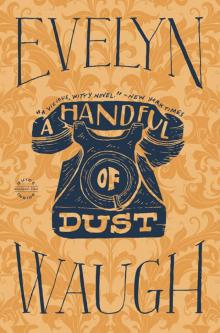 A Handful of Dust
A Handful of Dust Complete Stories of Eveyln
Complete Stories of Eveyln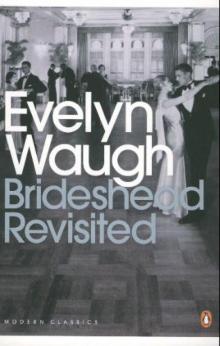 Brideshead Revisited
Brideshead Revisited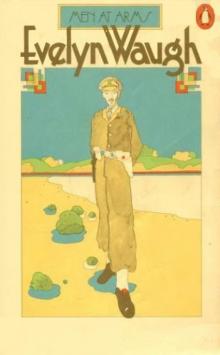 Men at Arms
Men at Arms Black Mischief
Black Mischief When the Going Was Good
When the Going Was Good Officers and Gentlemen
Officers and Gentlemen Helena
Helena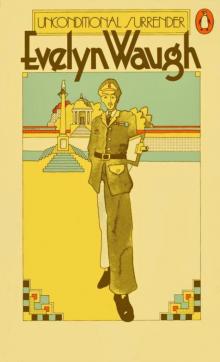 Unconditional Surrender
Unconditional Surrender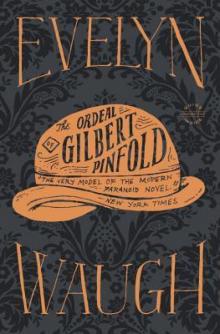 The Ordeal of Gilbert Pinfold
The Ordeal of Gilbert Pinfold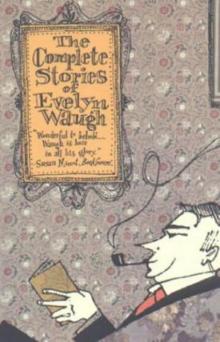 The Complete Stories Of Evelyn Waugh
The Complete Stories Of Evelyn Waugh